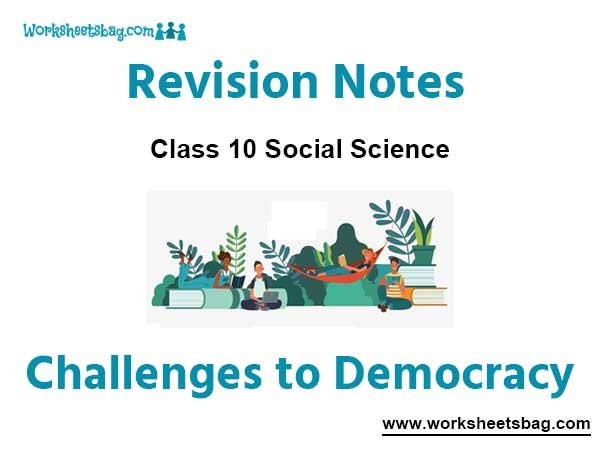Please refer to the Challenges to Democracy Revision Notes given below. These revision notes have been designed as per the latest NCERT, CBSE and KVS books issued for the current academic year. Students will be able to understand the entire chapter in your class 10th Challenges to Democracy book. We have provided chapter wise Notes for Class 10 Challenges to Democracy as per the latest examination pattern.
Revision Notes Chapter 8 Challenges to Democracy
Students of Class 10 Challenges to Democracy will be able to revise the entire chapter and also learn all important concepts based on the topic wise notes given below. Our best teachers for Grade 10 have prepared these to help you get better marks in upcoming examinations. These revision notes cover all important topics given in this chapter.
Challenge
- Those difficulties which are important and which can be overcome It carries within it an opportunity for progress.
- At least one fourth of the globe is still not under democratic government –
These countries face the following challenges:-
Foundational challenges transition → to democracy by bringing down the non – democratic rule (keeping military away) and setting up a sovereign state
Challenge of expansion → to ensure greater powers to local government, extension of federal principle to all inclusion of women and minority Groups etc. India, USA face it.
Deepening democracy → Strengthening of institution that help people‘s participation And control. Bring down the control of rich and powerful People in decision making.
Democratic reform or political reform → proposals about overcoming of various challenges to democracy
Ways and means of political reform in India
Through law – Carefully devised changes in law can discourage wrong political practices-
But this should be carried mainly by political activists, parties, movements and politically conscious citizens.
Legal changes must be carefully done – These must empower people to carry out democratic reforms like – The Right to information Act which empowers people to find out what is happening in the government. Such a law helps to ban corruption.
Reforms to be brought out principally – mainly to strengthen democratic practices like improve the quality of political participation by ordinary people.
Redefining democracy –
- The representatives (rules elected by people) must take all decisions.
- Fair opportunity to change the current rulers through elections.
- Choice and opportunity available to all the people on equal basis.
- This should lead to a government limited by basic rules of the constitution and citizen‘s right.
Condition for – a democracy or a description of a good democracy –
Right given to a citizen in democratic country → Right to vote, stand for elections, form political organization and social and economic right – like Right to information Act.
- A well-defined power sharing in democracy.
- Democracy give due respect to minority voice.
- Democracy work on eliminating discrimination based on caste, religion and gender.
- These are the outcomes we expect from democracy.
SHORT ANSWERS TYPE QUESTIONS
Question. How is the challenge of deepening of democracy faced by every democracy?
Ans.
- This involves string tuning of the institutions and practices of democracy.
- This should happen in such a way that people can realize their expectations of democracy.
- This requires an attempt to bring down the control and influence of the rich and powerful people in making governmental decisions.
Question. What are the basic rights of citizens for exercising voting Rights?
Ans.
- Elections must offer a choice and fair opportunity to the people to change the current rulers.
- The choice and opportunity should be available to all the people on an equal basis.
- The exercise of this choice must lead to a govt. limited by basic rules of the constitution and citizen‘s right.
Question. What does Foundational challenge to democracy mean? Which two aspects are included in this challenge?
Ans. Those countries which do not have democratic form of govt. face the foundational challenge of establishing democracy in the country. This involves bringing down the existing non- democratic govt. to keep the military away from capturing power and establishing a sovereign democratic state.
Question. Enumerate the challenges which democracies in the world face today.
Ans.
- Fundamental challenge — Those countries which do not have democratic form of govt. face the fundamental challenge of establishing democracy in the country.
- Challenge of Expansion — Countries having democratic setup face the challenge of expansion.
- Deepening of Democracy — This challenge is faced by almost all the democracies. This involves strengthening of the institutions and practices of democracies.
LONG ANSWERS TYPE QUESTIONS
Question. India faces the “Challenge of expansion”- Justify the given statement
Ans. Most of the established democracies face the Challenge of expansion. This involves applying the basic principle of democratic government across all the regions, different social groups and various institutions. Ensuring greater power to local governments, inclusion of women and minority groups etc. fall under this challenge.
• This means that less and less decisions should remain outside the arena of democratic control.
• Extension of federal principle to all the units of the federation.
A bill with a reservation of at least one-third of seats in Lok Sabha and State Assemblies for women has been pending before the Parliament.
Question. Define Political Reform and explain the broad guidelines while devising ways and means of political reforms?
Ans. Carefully devised changes in law can help to discourage wrong political practices and encourage good ones.
- Laws are important in political reform m. carefully devised changes in law can help to discourage wrong political practices and encourage good ones.
- Any legal change must carefully look at what results it will have on politics. Example -The RTI Act.
- Democratic reforms are to be brought about principally through political practice.
- Any proposal for political reforms should think not only about what is a good solution but also about who will implement it and how.

